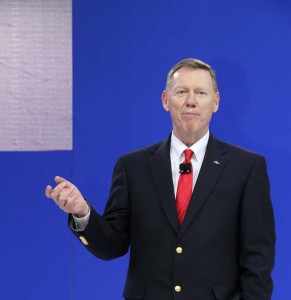
Ford "is competitive" despite a hefty debt load and an inability to match the concessions given GM and Chrysler, said CEO Alan Mulally.
Ford Motor Co. is fully competitive with its domestic rivals, and indeed with the rest of the auto industry, the automaker’s CEO Alan Mulally, tells TheDetroitBureau.com, despite its hefty debt load and its inability to win all the concessions it has sought from its U.S. workers.
There’s little doubt Ford is on a roll, industry analysts praising the efforts Mulally has made since joining the company, in 2006, and consumers responding well to the company’s latest product line-up. But those analysts also caution that there’s a downside that some believe could haunt the company.
Ford was the only one of Detroit’s Big Three to forego a federal bailout, last year, and to avoid plunging into bankruptcy like Chrysler and General Motors. “I’m pleased we respected all of our debt-holders and all of our stockholders,” Mulally proclaimed, following his keynote speech marking the opening of this year’s New York International Auto Show.
But the downside is that Ford couldn’t shed its tens of billions of dollars in debt like its cross-town rivals. And today, that adds up to millions of dollars in interest, alone, that Ford is covering while Chrysler and GM are not. That, said Mulally, is why Ford has been paying down its debt, converting some to equity, last year, and now scheduling another cash payment for its $23 billion “revolver,” the business equivalent, he suggested, of a home equity line.
“We’re going to keep improving the balance sheet,” he explained, in an interview, “but keep the entire revolver in place.”
If anything, having access to that line of credit was critical to Ford’s current success, the executive stressed, because it allowed the maker to continue working on its global product plans even while competitors scaled back their own efforts in the face of the worst industry recession in more than 70 years. And having access to that cash, Mulally insisted, will continue to cover Ford even in a potential double-dip recession.
But there’s no question, he added, that when it comes to paying back its debt and reducing its interest payment, Ford will “accelerate that as we get back to profitability,” said Mulally.
The other potential problem for the second-largest U.S. maker is the fact that it did not get all the concessions granted GM and Chrysler during their bankruptcy proceedings by the United Auto Workers Union. Among other things, the union agreed to a non-strike clause, while other givebacks improved costs and productivity.
Buoyed by Ford’s relative prosperity, UAW members overwhelmingly rejected the maker’s request for similar concessions, last year.
But Mulally focuses on the bright side of the company’s labor situation, noting Ford has gotten the “vast majority” of things it needed from the UAW, largely through its 2007 contract. That “transformational” agreement created a two-tier wage system, for example, and a VEBA, an employee-run retiree health care program that took billions of dollars of additional liabilities off Ford’s books.
While some observers might question the assertion, Mulally declared that Ford is “competitive with the best (car) companies in the world.” And any penalties Ford might face as the result of skipping the bailout-and-bankruptcy route, the executive said, are more than offset by the advantages of having pulled through the downturn on its own.
